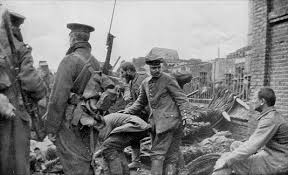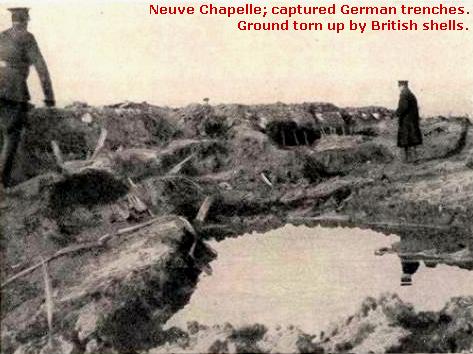Initial Success Yields to Disaster; Communications Confusion Brings Tragedy
Special to The Great War Project
(8-10 March) After weeks of little action on the Western Front, the British launch a major attack on the Germans at the already destroyed French village of Neuve Chapelle. The goal: to break through the German trench lines and capture the village of Aubers.
The date is 10 March a century ago.
“At the start of the battle,” writes historian Martin Gilbert, “342 guns launched a 35-minute barrage on the German trenches, the artillery fire being directed in part by 85-reconnaissance aircraft.”
According to war historian John Keegan, “the Germans are taken completely by surprise,” a rare occurrence.
After that, British and Indian divisions “attacked along a 4000-yard front.”
The fighting is fierce, sometimes as close as hand-to-hand combat.
The British offensive is initially successful; Neuve Chapelle is captured, with the British overrunning four lines of German trenches.
Yet at Aubers village, there is a problem – the British guns fail to hit a 400-yard stretch of the line. “The guns allocated to that sector had not reached the front,” reports Gilbert.
The consequences are tragic. Gilbert writes: “The men who advanced on that sector, in three successive waves, crossed No-Man’s-Land toward an intact German wire.”
According to the Official History of the battle at Neuve Chapelle, “It was thought at first that the attack succeeded in reaching the German trenches as no one behind could see and not a man returned.”
Gilbert writes…
“No man returned because every one of the attackers, almost a thousand, had been killed.”
The debacle at Neuve Chapelle occurs in part because British communications are disastrously inadequate. “Telephone lines having been cut by German shellfire, messages often long-winded and sometimes unclear, had to be sent back and forth by messenger.”
“Sometimes,” Gilbert reports, “crucial messages crossed in mid-journey, requiring new messages and creating an added muddle.”
British intelligence about the strength of the German forces in the area is also inaccurate, leading to misjudgments about the timing of attacks. In one sector, a British colonel refuses to give the order to advance, announcing “No, it is a mere waste of life, impossible to get twenty yards, much less two-hundred.”
“The trenches have not been touched by artillery,” the colonel continues. “If artillery can’t reach them the only way is to advance from the right flank. A frontal attack will not get near them.”
Nevertheless, General Sir Douglas Haig, the British commander, orders a frontal attack,” reports historian Gilbert.
“Almost all those who took part in it were killed.”
The fighting at Neuve Chapelle does not stop. The battle rages on.


